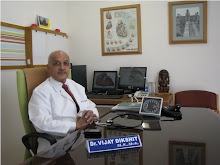Dr.Vijay Dikshit
Tuesday, August 18, 2009
Robotic Heart Surgery
Robotically-assisted heart surgery technology involves insertion of surgical instruments through pencil sized holes, instead of the conventional way of making a 12 to 15 inch long incision required to split a patient's breast bone. An endoscope and two surgical instruments are passed through tiny incisions in the chest wall. The surgeon views the image provided by the endoscope on a computer screen. Instead of manipulating the surgical instruments directly, the surgeon manipulates them via a computer console - similar to manipulating a computer games console. The computer interprets the surgeon's hand movements and causes the surgical instruments to respond accordingly. This system addresses the major disadvantages of moving the long surgical instruments manually - computer control of the surgical instruments essentially eliminates the tremor effect, and also the non-intuitive feel of maneuvering such instruments.
The Robotic Surgical System enhances a surgeon's hands much like a microscope enhances a surgeon's eyes. This 'enhancement' gives the surgeon the extra precision and dexterity necessary to perform these very delicate procedures without having to crack the patient's chest, wide open.
While it takes special training to become adept at using robotically-assisted instruments, most surgeons who have had such training report that they feel quite comfortable maneuvering surgical instruments via a console instead of directly.
Much of the early work with robotically-assisted heart surgery has been with bypass surgery, limited to single bypass grafts. However, it is predicted that with advances in technology, multiple grafts with robotic assistance will be possible, at virtually any location on the heart.
The chief advantage of such surgery is incisions that are made are tiny, eliminating the large incision and provide the benefits of significantly reduced patient pain and trauma, shorter recovery times and convalescent periods. Rapid recovery from cardiac surgery is not only better for the patient, but it is also less expensive.
The chief disadvantage at this point is that the technology is new, and (despite early encouraging reports) is still evolving. Its efficacy and safety have not yet been proven sufficiently.
Another disadvantage is the cost of the robotic systems. The bottom line: it is likely to be several years before robotic heart surgery is widely available.
However this technology throws open new possibilities, for instance, a surgeon performing a heart operation while sitting at a console 15 feet away from the patient, can also perform with equal efficiency the same operation while sitting 1500 miles away from the patient. In other words patients could be operated upon by only the very best surgeons.
Dr. Vijay Dikshit, MS, MCh
Chief Cardiothoracic Surgeon.
About Me
I, DR. VIJAY DIKSHIT have been working as a Cardio- Thoracic Surgeon for last 31 years (since 1978). My Post Graduation studies and Cardio-Thoracic Surgery at King George’s Medical College, Lucknow University. In my career successfully completed 13208 heart Surgeries with 99.1 percent success rate.
Completed my Housemanship (Jan 1974 – Dec 74) King George’s Medical College, Lucknow University Gandhi Memorial & Associated Hospital, Lucknow. I am starting General Surgery’s in (Jan 1975 – Dec 77) King George’s Medical College, Gandhi Memorial & Associated Hospital, Lucknow.
In December 1984 I have Appointed Consultant Cardio-Thoracic Surgeon at Apollo Hospital, Madras which is the state of the heart multi-speciality hospital of the country, went on to establish the reputation as the best Heart hospital in India. Here I worked in close association with Stalwarts like Dr. M.R. Girinath who was the senior Consultant. Together with Dr. Girinath we performed over 6000 Open Heart Operations between years 1984 – 1991, which was a record number of Open Heart Surgeries in any hospital of the country at that time.
In the year 1991 September, established a modern high-tech Cardio-Thoracic Department at Apollo Hospital, Jubilee Hills, Hyderabad and presently continuing as Chief Cardio-Thoracic Surgeon since then At Hyderabad Apollo Hospital I have operated on 10300 patients for Cardio-Thoracic Surgeries, out of which 8588 patients underwent Open Heart Surgeries including 6299 patients Coronary Bypass Surgeries, 2289 patients for Valve Replacements and Congenital Cardiac Corrections, and Miscellaneous Cardiac Surgeries.
Our septal superior approach for exposure of Coronary Bypass Surgeries, Heart Valve Surgeries including Valve Replacements & Valve Repair Operations, Correction of Congenital Cardiac Defects, Miscellaneous Cardiac Operations like Cardiac Tumors, etc.

